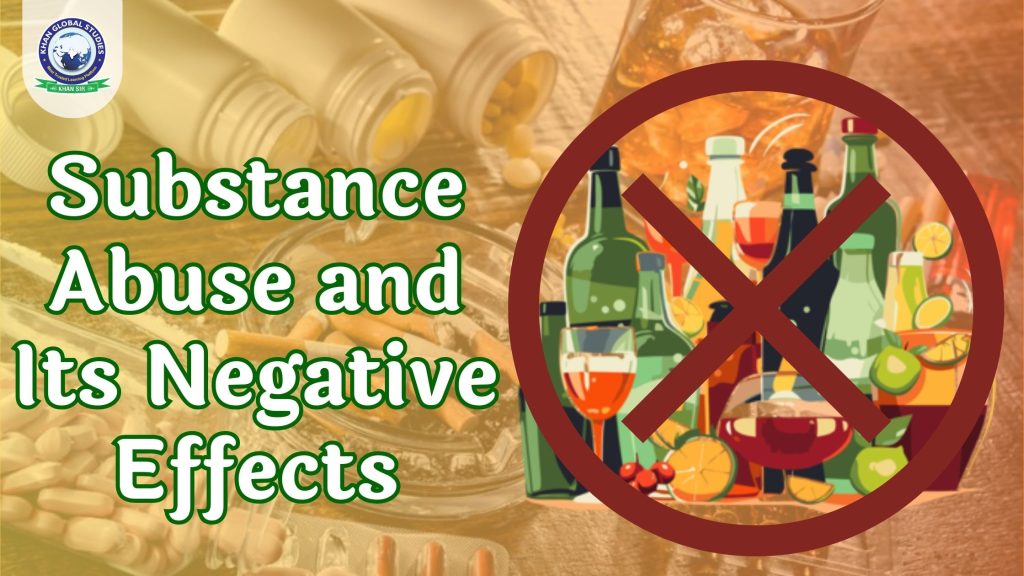Substance abuse or drug misuse is a widespread issue that affects people around the world. It can lead to serious physical, mental and social consequences, causing long-term harm to individuals, families and communities. In this article, we will explore the causes of drug addiction, its devastating effects, and effective ways to prevent and treat substance abuse.
What is Substance Abuse?
Substance abuse refers to the excessive and harmful use of substances such as alcohol, tobacco, prescription medications and illicit drugs or addictions such as heroin, cocaine or methamphetamine. It is characterised by the compulsive seeking and use of substances despite negative consequences. The most common types of substances abused are:
- Alcohol
- Prescription medications (opioids, sedatives)
- Illicit drugs (heroin, cocaine)
- Inhalants
Nicotine
While some people use drugs for recreation, many develop dependence or addiction, leading to chronic and uncontrollable cravings. Substance use disorder is a recognized medical condition that affects the brain and behaviour, making it difficult for individuals to stop using drugs even after knowing the risks.
Common Causes of Substance Abuse
Several factors contribute to the development of substance abuse, including:
- Environmental Factors: People exposed to drug use at an early age, whether in their family, peer group, or community, are more likely to develop a substance use disorder. Social environments that promote drug use may also make it seem acceptable or desirable.
- Psychological Factors: Many individuals turn to drugs to cope with stress, anxiety, depression, or trauma. People with mental health disorders have a higher risk of developing addiction as a way of self-medicating.
- Genetic Predisposition: Genetics plays an important role in determining a person’s susceptibility to substance abuse. People who have a family history of addiction are more likely to develop a similar problem.
- Peer Pressure: In teens and young adults, peer pressure can be a powerful influence that leads to experimentation with drugs or alcohol. The desire to fit in and be accepted by others can lead people to try substances they might not otherwise consider.
Negative Effects of Substance Abuse
The effects of substance abuse are far-reaching and can affect every aspect of a person’s life, including their health, relationships, career, and legal status. Below are some of the primary consequences of drug abuse:
- Physical Health Consequences: Drug abuse can lead to a variety of health problems, which can be both immediate and long-term. These may include:
- Heart disease
- Lung damage
- Liver failure (especially from alcohol or opioid abuse)
- Neurological impairment
- Overdosage and death
- Long-term drug abuse often weakens the immune system, making a person more susceptible to infection.
- For example, intravenous drug abusers are at a higher risk of contracting HIV and hepatitis.
- Mental Health Problems: Drug abuse has significant effects on the brain. Long-term substance abuse commonly results in mood disorders such as anxiety and depression. Many drugs also impair cognitive function, causing memory problems, decreased attention span, and impaired decision-making ability.
- Social and Family Effects: Drug abuse can destroy personal relationships, leading to family conflict, divorce, and social isolation. Friends and family members may struggle to deal with the erratic behaviour of an addicted person, resulting in broken trust and emotional distance.
- Legal and Financial Problems: People who abuse drugs often face legal troubles, including arrest for drug use, drunk driving, or drug-related violence. Additionally, drug addiction can cause serious financial difficulties, as people may lose their jobs, deplete savings, and have difficulty meeting basic living expenses.
Drug Abuse Prevention
Prevention is essential to reduce the incidence of drug abuse. Here are some effective strategies:
- Education and Awareness: Raising awareness about the dangers of drug abuse through school programs, community outreach, and media campaigns can help prevent drug abuse, especially among young people.
- Strengthening Family and Community Ties: Strong support systems in families and communities can serve as protective factors against substance abuse. Encouraging open communication and emotional support within families can significantly reduce the risk of drug use.
- Access to Mental Health Care: Providing individuals with access to mental health services can help address underlying conditions, such as anxiety or depression, that often lead to substance abuse. Early intervention is critical to preventing addiction.
- Peer Support Programs: Peer support groups such as Alcoholics Anonymous (AA) or Narcotics Anonymous (NA) provide people with a supportive network that can help them recover from addiction and prevent relapse.
Treatment Options for Substance Abuse
For people who are already struggling with substance abuse, several treatment options are available to help them recover:
- Detoxification: Detox programs focus on safely removing drugs or alcohol from a person’s system. This process can be uncomfortable and requires medical supervision to manage withdrawal symptoms.
- Counselling and Behavioral Therapy: Cognitive-behavioral therapy (CBT) is a highly effective treatment for substance abuse. It helps individuals identify the root causes of their addiction and develop healthy coping mechanisms.
- Medication-Assisted Treatment (MAT): Certain medications can be used to treat substance use disorders. For example, methadone or buprenorphine can be used to manage opioid dependence and reduce craving and withdrawal symptoms.
- Rehabilitation Programs: Hospitalized or outpatient rehabilitation programs provide comprehensive treatment for addiction, including medical care, therapy, and support services.
- Support Groups: Continued participation in support groups is crucial to maintaining long-term recovery. These groups provide a community of individuals who understand the struggle of addiction and can offer guidance and encouragement.
Conclusion
Substance abuse is a serious issue that affects individuals, families, and society as a whole. The consequences of drug abuse are severe, ranging from health problems to legal issues and social isolation. However, through education, prevention strategies, and access to effective treatment, it is possible to combat the devastating effects of substance abuse.
Frequently Asked Questions
Question: What are the most commonly abused substances?
Answer: Alcohol, opioids, prescription medications such as nicotine, and illicit drugs such as cocaine, heroin, and methamphetamine are among the most commonly abused substances.
Question: What is the most effective treatment for substance abuse?
Answer: The most effective treatment depends on the individual and the abused substance. A combination of detoxification, behavioural therapy, medication-assisted treatment, and support groups often produces the best results.
Question: Can substance abuse cause mental health disorders?
Answer: Yes, long-term substance abuse can cause or exacerbate mental health disorders such as depression, anxiety, and paranoia.
Question: How can substance abuse be prevented?
Answer: Prevention can be achieved through education, strengthening family support systems, addressing mental health problems early, and encouraging participation in community programs and peer support networks.
Question: Where can I get help for substance abuse?
Answer: If you or someone you know is struggling with substance abuse, seek help from a healthcare professional, a rehabilitation center, or a peer support group like Alcoholics Anonymous.
Also Read:
- Women Safety in India: About, Law and Policies
- Making of the Indian Constitution: About and Objective





